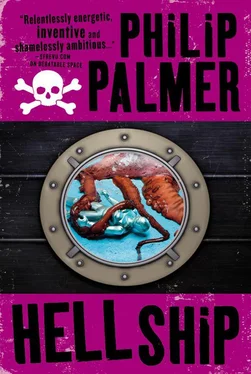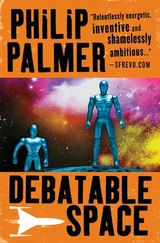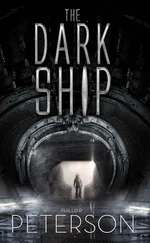Philip Palmer - Hell Ship
Здесь есть возможность читать онлайн «Philip Palmer - Hell Ship» весь текст электронной книги совершенно бесплатно (целиком полную версию без сокращений). В некоторых случаях можно слушать аудио, скачать через торрент в формате fb2 и присутствует краткое содержание. Жанр: Фантастика и фэнтези, на английском языке. Описание произведения, (предисловие) а так же отзывы посетителей доступны на портале библиотеки ЛибКат.
- Название:Hell Ship
- Автор:
- Жанр:
- Год:неизвестен
- ISBN:нет данных
- Рейтинг книги:3 / 5. Голосов: 1
-
Избранное:Добавить в избранное
- Отзывы:
-
Ваша оценка:
- 60
- 1
- 2
- 3
- 4
- 5
Hell Ship: краткое содержание, описание и аннотация
Предлагаем к чтению аннотацию, описание, краткое содержание или предисловие (зависит от того, что написал сам автор книги «Hell Ship»). Если вы не нашли необходимую информацию о книге — напишите в комментариях, мы постараемся отыскать её.
Hell Ship — читать онлайн бесплатно полную книгу (весь текст) целиком
Ниже представлен текст книги, разбитый по страницам. Система сохранения места последней прочитанной страницы, позволяет с удобством читать онлайн бесплатно книгу «Hell Ship», без необходимости каждый раз заново искать на чём Вы остановились. Поставьте закладку, и сможете в любой момент перейти на страницу, на которой закончили чтение.
Интервал:
Закладка:
“Even if he is annoyingly repetitious,” Quipu Two sniped.
“My point now is: how do we know all this?” I asked.
Baffled stares greeted me.
But this was the crux of it!
All on the Hell Ship lived their lives according to various beliefs-or, as I would term them, myths. But where did these fucking myths come from?
Quipu shrugged, five-foldly. “These are things we simply know,” Quipu One said. And Quipu Two added:
“Some knowledge is like that. Geometry, the difference between up and down, mathematics. It is called innate knowledge.”
“Is there any other kind?” Sai-ias asked; and I marvelled once more at the oddness of her mind.
“Innate knowledge, that turns out to be utterly false?” I pointed out gently.
The Quipus took my point. But Lirilla, Fray, Doro and Sai-ias still had no notion what I was driving at.
“Another question: Why have slaves?” I continued.
“I don’t understand what you mean,” said Fray, irascibly.
“If they were really all powerful,” I argued, “the Ka’un wouldn’t need you to fight their godsforsaken battles. They have technology. They have weapons. But they are few. Remember that. And they are cowering from us now, afraid.”
They pondered my words, and saw the sense. Then I waited a few moments more.
“There is something else,” said Sai-ias, astutely, “that you want to explain to us. Isn’t there?”
I smiled. “Let me show you, instead.”
They journeyed with me to the mountains; and from there I led them into a cavern in the rock. The cavern was wide, but even so Sai-ias had to compress her body five-fold to get through. Quipu followed, agile on his five legs, Fray lumbered after him; Lirilla flew ahead; while I leaped confidently from rock to rock.
And there we found an underground waterfall, spilling out of the mountain.
“This is the source,” I said, “of the well of the water of life.” And I took a knife and gouged a line in my arm. Blood flowed; then I dipped the arm in the water. When I removed it, the cut was healed instantly, without so much as a delay of a few seconds.
Then I reached into the water and pulled out a large sack. I opened the sack.
Inside the sack was one of the brains of Djamrock, sundered into many parts, but still pulsing as it had when it was alive.
“What is this?” Sai-ias asked, shocked.
“I retrieved it,” I said, “from-I do not care to elaborate-from the leavings of Cuzco that were-voided-after he killed Djamrock, and before he was banished. This is the brain of Djamrock, or parts of it.” I prodded the flesh of the brain segments with a finger; it throbbed. “The cells are alive, though Djamrock’s mind is dead. But the flesh, you see, doesn’t rot.”
“What have you done?” said Sai-ias, in appalled tones.
“I am performing an experiment,” I told her sharply. “Into the nature of our captivity.”
The dead shards of brain pulsed, eerily; the mood of my listeners had turned dark and sombre. But I ignored the bleak mood and continued.
“Facts and myths,” I said. “Let us consider them in turn.
“The first myth: we on the ship cannot die. Not true; Djamrock was killed and now he is dead; these are merely cell samples. You believe his consciousness lives on in his sundered body? I ask you, what evidence do you have for that? It is just a belief, a superstition. Let us discount it.
“The second myth; the air translates. Who told you that? No one. How do you know it then? Because some things are just known, like… geometry? That’s one possibility, but it makes little sense.
“So think about this,” I said, softly, letting my words enter their minds like a whisper on the breeze. “What if the thought were planted in your head. Like a whisper, on the breeze. A thought that says: ‘The air you breathe can translate your every word.’ Easily done.”
“A thought, in the head? It’s impossible,” said Quipu.
“In my civilisation,” I said, “we have a thing called a pakla, inserted into the brains of each of us. It allows us to communicate at a distance. And we can use the pakla to translate. You program it with data about the languages involved, and it turns alien speech automatically into words I understand. I have used it often thus.”
“Pakla?” asked Quipu One.
“That’s our name for what you call a smallworlds mechanoid mind, and some of the creatures on this ship call-well, whatever. It’s convergent evolution at work; many species have achieved the same technological breakthroughs.”
“Not mine,” Sai-ias said. “We have no use for mechanical brains.”
“Nor ours,” said Quipu One. “We remember every fact we encounter; numbers are like music to us; we could not create a machine cleverer than I.”
“Or I,” added Quipu Two, competitively.
“Watch this,” I said, and I teased apart the shards of Djamrock’s brain with a knife until a small crystal was visible. I gouged the crystal out and showed them. “This is how they control us. Paklas in the brain. They translate for us, they spy on us. As we already discussed, very small paklas in our blood stream rejuvenate us, by manipulating our hormones to regenerate dead cells that wouldn’t usually regenerate. The water of the well of life is rich in these miniscule-paklas, that’s how it is able to heal us. ‘Despair’ is, I suspect, a chemical reaction in the tissues of the body induced by an imbalance in the hormones in the brain, synthesising minerals dissolved in our blood from these lurking paklas. Flesh becomes stone; though it’s not really stone, it’s a crystalline form of carbon.
“Despair in short is a way of keeping us docile; if we aren’t happy, our bodies are turned to stone. Enjoy your lot-or die! Evil, but effective; and the technology is not so very hard.”
“The Ka’un have powers beyond our imagining,” Sai-ias informed me, anxiously.
“That’s only because you’re so fucking dumb, Sai-ias! My civilisation’s science is considerably more advanced than yours,” I said, scornfully. “Give me a lab and equipment, I could replicate all these effects.”
“You can control minds?” said Sai-ias.
“We have done so. Not any more, we fought a war over it with the Southern Tribes. Not all our wars are futile,” I added, tauntingly.
After the encounter with Djamrock’s brain, and my final explanations of how the Ka’un control us, we returned to the grasslands. The planning stage was over. The war was about to begin.
And each of the creatures on our world had a part to play in my complex and audacious battleplan.
The aerials patrolled the sky; they could warn us at once if the Ka’un made any attempt to open the firmament and attack us from above.
Sai-ias had spent three days motionless in the waters near the Tower, studying the movements of the Metal Giant. And, as I predicted, she saw it vanish-proving that it was a projection turned off by a simple switch. And she also saw a two-legged creature emerge from the earth, and wander around for a while. This was a Ka’un, I was sure of it. The Tower wasn’t their home, but it was their way in and out of the interior world.
And so it was the Tower we would attack. Sai-ias and the sea-creatures would carry land-warriors under the gap in the force protector shield. And when an army was gathered inside, we would break open the entrance way to the Ka’un’s section of the ship and flood into the exterior world, where dwelled the Ka’un.
At the same time, using the Temple building as our scaffold, we would attempt to breach the very sky, using the strength of the giant sentients like Fray and Ioday and Miaris to rip apart the metal hull. Serpentines would be hauled up and would squeeze through the gap created; and they would advance mercilessly upon our enemies who resided, so I believed, on the other side of the sky.
Читать дальшеИнтервал:
Закладка:
Похожие книги на «Hell Ship»
Представляем Вашему вниманию похожие книги на «Hell Ship» списком для выбора. Мы отобрали схожую по названию и смыслу литературу в надежде предоставить читателям больше вариантов отыскать новые, интересные, ещё непрочитанные произведения.
Обсуждение, отзывы о книге «Hell Ship» и просто собственные мнения читателей. Оставьте ваши комментарии, напишите, что Вы думаете о произведении, его смысле или главных героях. Укажите что конкретно понравилось, а что нет, и почему Вы так считаете.












